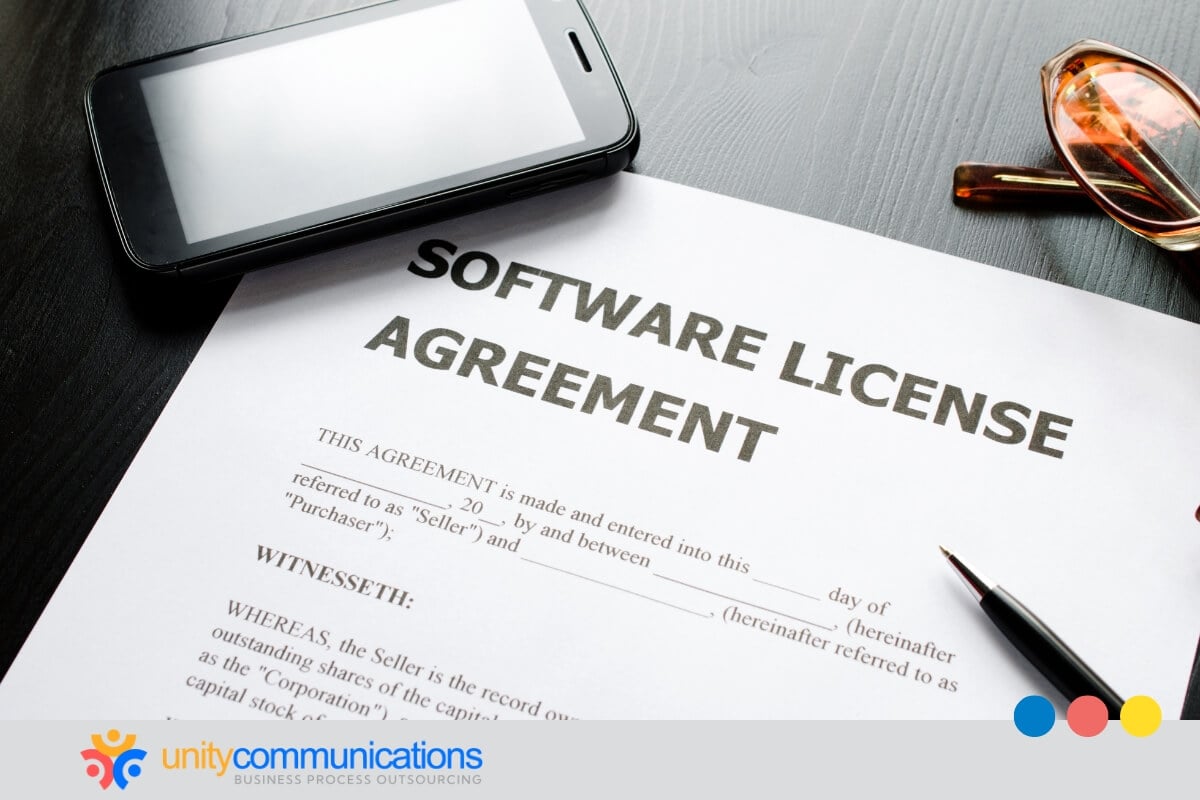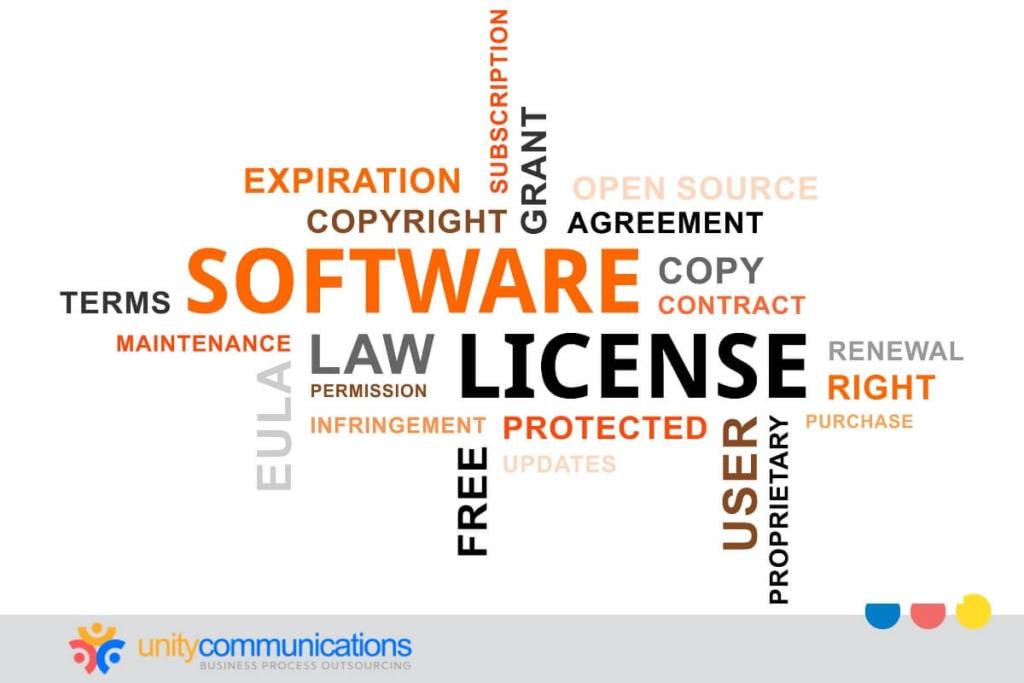IN THIS ARTICLE
Table of Contents
Business process outsourcing (BPO) companies utilize software to oversee operations, facilitate communication among various stakeholders, and fulfill diverse needs. Software usually requires license activation or acceptance of specific terms and conditions before installation or access.
Software licenses come in different forms, each with varying terms, support arrangements, limitations, and expenses. Users must grasp the fundamentals of software licenses to fully comprehend their responsibilities and comply with legal terms and constraints.
This article explores the interconnection between BPO and software licensing. It discusses the licensing regulations that affect BPO operations and strategies for managing compliance.
Impact of software licensing on BPO operations

Outsourcing providers often utilize various software tools and applications to perform business processes efficiently and effectively for their clients. In outsourcing, software licensing refers to the legal agreement between the BPO firm and the software company that governs the authorized use of software applications in BPO operations.
The BPO company enters into a license agreement with the software developers, which outlines the terms and conditions of using the software. This agreement specifies the number of licenses purchased, permitted usage, payment terms, support services, and any restrictions or limitations on usage.
BPO organizations can acquire different types of software licenses based on their specific needs and usage patterns, including:
- Individual user licenses;
- Concurrent licenses, where a limited number of users can access the software simultaneously; and,
- Site licenses, which allow unlimited usage within a single location.
BPO companies must ensure compliance with software licensing terms to avoid legal issues such as copyright infringement or breach of contract. Compliance may involve tracking the number of users accessing the software, adhering to usage restrictions, and renewing licenses as required.
Software vendors might conduct periodic audits to verify the BPO company’s compliance with the terms of the license agreement. During these audits, the vendor can review usage data, verify the number of licenses in use, and ensure that the software is used per the agreed-upon terms.
Non-compliance with software licensing agreements can expose BPO companies to significant risks, including financial penalties, legal disputes, and reputational damage. Sixty-four percent of companies audited by software vendors were subject to extra charges for non-compliance.
Therefore, fully understanding software licensing terms, implementing robust processes for managing licenses, and ensuring compliance are essential for mitigating these risks.
Overview of software licensing regulations affecting BPO operations
Software licensing regulations play a crucial role in governing the legal use of software within BPO operations. Here’s an overview of the critical software licensing regulations that affect the industry:
- Copyright law. Copyright law protects software as intellectual property (IP), granting exclusive rights to the software vendor. BPO companies must comply with copyright regulations by ensuring they have valid licenses for all software used in their operations. Violating copyright law can lead to legal consequences such as fines or injunctions.
- End-user license agreements (EULAs). EULAs are contracts between the software vendor and the end user that specify the terms of software use. BPO companies must carefully review and abide by EULAs when using software. EULAs typically outline permitted usage, restrictions, limitations, and consequences for non-compliance.
- Software asset management (SAM). SAM involves managing and optimizing an organization’s purchase, deployment, maintenance, and use of software. BPO companies should implement SAM practices to ensure compliance with licensing agreements, minimize costs, and reduce legal risks associated with software misuse.
- International regulations. BPO companies operating worldwide must consider software licensing regulations in different jurisdictions. Software licensing laws and enforcement mechanisms vary between countries, requiring BPO companies to adapt their compliance efforts accordingly.
- Open source software (OSS) licensing. BPO operations may utilize open-source software, typically governed by licenses such as the GNU General Public License (GPL) or Apache License. BPO companies must understand the terms of OSS licenses, including requirements for attribution, redistribution, and derivative works.
- Cloud computing and software as a service (SaaS). BPO companies increasingly rely on cloud-based software and SaaS solutions with subscription-based licensing models. In fact, 70% of software that companies use is SaaS. BPO companies must know the terms of cloud service agreements and comply with usage limits and subscriptions.
Compliance challenges for BPO in software licensing

BPO firms face several compliance challenges related to software licensing due to the complex nature of their operations and the diversity of software applications they use. Some of the key compliance challenges they face include:
- License management complexity. BPO operations use numerous software applications from different vendors, each with its own licensing terms and conditions. Managing licenses for multiple software products can be complex and labor-intensive, leading to difficulty tracking license usage, renewal dates, and compliance status.
- Shadow information technology (IT). Shadow IT is the use of software and applications without the knowledge or approval of the IT department. Employees may download and use unlicensed software or share licensed software beyond its authorized scope, leading to the unauthorized use of software and potential licensing violations.
- License overuse or underuse. BPO firms may struggle to optimize software license usage, leading to inefficiencies and compliance risks. Overusing licenses can result in additional costs while underusing them can indicate wasted resources. Balancing license utilization with business needs requires careful planning and monitoring.
- Complexity of license types. Software vendors offer various license types, such as per-user, per-device, concurrent, or subscription-based licenses. Understanding the terms and restrictions of each license type can be challenging, particularly when deploying software across different departments, locations, or user groups.
- Contractual ambiguity. Software license agreements contain complex language, ambiguous terms, or hidden clauses that can be challenging to interpret. BPO firms must carefully review and negotiate licensing contracts to ensure clarity and transparency regarding rights, obligations, and compliance requirements.
- SAM maturity. Implementing robust SAM practices is essential for ensuring compliance with software licensing agreements. However, many BPO firms may lack mature SAM processes, leading to inadequate license tracking, poor visibility into software usage, and increased compliance risks.
Strategies for managing software licenses in BPO
Managing software licenses effectively is crucial for BPO companies to ensure compliance, minimize costs, and optimize resource utilization. So, what is BPO’s role in ensuring compliance with software licenses? Here are some strategies BPO companies can utilize to manage software licenses:
- Centralized license management. Establish a centralized system or platform for managing all software licenses across the organization. This centralized approach enables better visibility, control, and tracking of license usage, renewals, and compliance status.
- Inventory and assessment. Conduct a comprehensive inventory of all software assets used within the organization. Assess the license types, terms, and conditions associated with each software application to identify potential compliance risks and opportunities for optimization.
- License optimization. Optimize software license usage to minimize costs while meeting business needs. Consolidate redundant licenses, redistribute underutilized licenses, and negotiate volume discounts with software vendors to optimize license agreements and reduce expenses.
- Automated license tracking. Implement software tools or license management solutions to automate the monitoring and management of software licenses. These tools can provide real-time insights into license usage, compliance status, and renewal deadlines, enabling proactive license management and risk mitigation.
- SAM practices. Implement robust SAM practices to govern the lifecycle of software assets effectively. SAM involves processes for procurement, deployment, maintenance, usage tracking, and retirement of software licenses, ensuring compliance and cost optimization throughout the software lifecycle.
The bottom line

For BPO, software licensing entails obtaining the necessary permissions to use software applications legally, adhering to the terms of the license agreements, and effectively managing licenses to support BPO operations while minimizing compliance risks.
By staying informed about software licensing regulations and implementing effective compliance measures, BPO companies can minimize legal risks, ensure the legality of their software usage, and maintain trust with clients and stakeholders.
Let’s connect if you want to learn more about Unity Communication’s BPO services.





